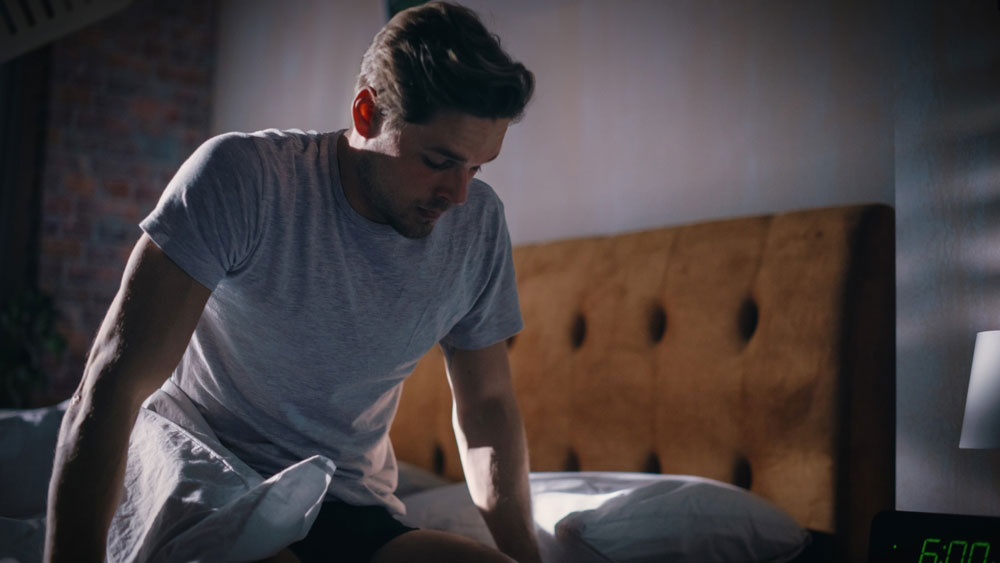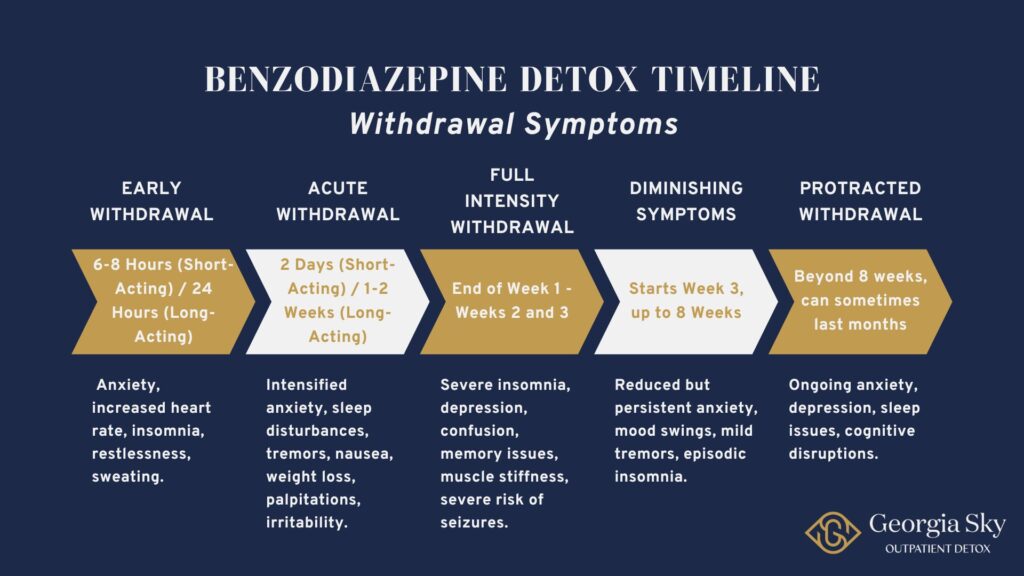Benzo Detox + Withdrawal Guide
Benzodiazepines, commonly referred to as benzos, are a class of medications known for their sedative effects, often prescribed for anxiety, insomnia, and various other medical conditions. However, addiction to benzos has been continually increasing in the U.S. over the past several decades. Their potential for dependence and withdrawal challenges necessitates a careful approach to quitting. At Georgia Sky, we are here to help you detox in the safest, most comfortable way possible.

Key Takeaways:
- High Risk of Withdrawal: Benzodiazepine withdrawal is considered one of the most dangerous, with risks ranging from severe anxiety and physical tremors to life-threatening seizures and psychosis.
- Withdrawal Symptoms: Common symptoms include anxiety, sleep disturbances, sweating, nausea, muscle pain, and severe cases can lead to hallucinations and cognitive disturbances.
- Controlled Tapering: Tapering off benzodiazepines gradually, such as using the Ashton Method with longer-acting benzos like diazepam, is crucial to minimize withdrawal symptoms and reduce risk.
- Supervised Medical Detox: Due to potential severe complications, medical supervision is recommended to safely manage the detox process and provide necessary interventions.
- Support and Patience Needed: Successful detox requires a careful tapering strategy and psychological support and patience, acknowledging the slow and challenging nature of benzo withdrawal.
What Are Benzodiazepines?
Benzodiazepines are psychoactive drugs that enhance the effect of the neurotransmitter gamma-aminobutyric acid (GABA) at the GABA-A receptor, resulting in sedative, hypnotic (sleep-inducing), anxiolytic (anti-anxiety), anticonvulsant, and muscle relaxant properties. Common examples include:
- Clonazepam (Klonopin): Used to treat seizure disorders and panic disorders.
- Alprazolam (Xanax): Prescribed for anxiety disorders and panic attacks.
- Diazepam (Valium): Utilized for anxiety disorders, alcohol withdrawal symptoms, and muscle spasms.
Benzodiazepine Withdrawal Symptoms
Withdrawal from benzodiazepines is notably challenging and can be extremely hazardous, often regarded as one of the most dangerous drugs from which to detox. The intensity and range of withdrawal symptoms largely depend on the duration of benzodiazepine use, dosage, and individual physiology. Here’s a comprehensive look at the symptoms and risks:
- Anxiety and Irritability: These are common initial symptoms that can range from mild unease to severe panic conditions.
- Sleep Disturbances: Insomnia and changes in sleep patterns are typical, complicating the recovery process.
- Physical Tremors: These often manifest in the hands and can extend to other parts of the body, reflecting central nervous system distress.
- Sweating: Excessive sweating is a frequent physical response to benzodiazepine withdrawal.
- Panic Attacks: Episodes can occur unexpectedly, characterized by intense fear and physical symptoms like shortness of breath, palpitations, and dizziness.
- Nausea: Along with possible vomiting, it can make it difficult to maintain adequate nutrition.
- Muscle Pain and Stiffness: These symptoms can be debilitating, affecting mobility and everyday activities.
- Cognitive Disturbances: Confusion, memory loss, and reduced cognitive function reflect the brain’s struggle to adjust to the absence of the drug.
- Hallucinations: Visual or auditory hallucinations are more common in severe cases and indicate a significant neurological impact.
- Seizures: These can occur in severe withdrawal scenarios and pose a serious risk of injury or death.
- Psychosis: In extreme cases, withdrawal can induce psychotic episodes, characterized by delusions or severe disorientation.
- Risk of Death: Unlike many other drug withdrawals that are uncomfortable, benzodiazepine withdrawal can be life-threatening, primarily if seizures occur without medical supervision.
Due to the severity and potential complications of benzodiazepine withdrawal, it is crucial to undergo detox under professional medical guidance. A controlled treatment plan can provide the necessary safety measures and medication to mitigate severe symptoms, reducing the risk of long-term health consequences or fatal outcomes.
Withdrawal Timeline
The timeline for benzodiazepine withdrawal can vary depending on dosage, type of medication, history of usage, etc:
- Short-acting benzos (like Alprazolam): Symptoms can appear within 6-8 hours, peak around the second day, and improve by the fourth or fifth day.
- Long-acting benzos (like Clonazepam): Withdrawal symptoms might not appear for a week or more, peak in the second week, and gradually decrease over several weeks or months.

Benzo Withdrawal and Tapering Strategies
Tapering is the recommended approach for discontinuing benzodiazepines to minimize withdrawal symptoms and reduce the risk of severe side effects, such as seizures.
- General Tapering Schedule: A gradual reduction by about 10% of the initial dose per week is a commonly advised schedule. However, the pace can be adjusted based on individual tolerance to dose reductions.
- Clonazepam and Xanax Tapering Schedule: Specific taper schedules can vary, and often a more conservative taper (e.g., reducing the dose by 5% every 2-3 weeks) may be necessary to manage symptoms effectively.
- The Ashton Method: This tapering strategy was designed by Dr. Heather Ashton for safely discontinuing benzodiazepines. It involves gradual dose reductions using longer-acting benzodiazepines like diazepam to minimize withdrawal symptoms, allowing for a controlled and less distressing withdrawal process. This method emphasizes individualized pacing and supportive care to address both the psychological and physical aspects of withdrawal.
- Supplement Management: Magnesium, omega-3 fatty acids, vitamin C, and vitamin D have been researched to manage withdrawal symptoms, although it is still best to use under medical guidance.
Tips for a Successful Benzo Detox
- Consult a Healthcare Professional: Doctors experienced in benzodiazepine withdrawal can develop a personalized tapering schedule.
- Supportive Care: Access to psychological support and counseling can help manage the emotional and psychological challenges of withdrawal.
- Monitoring and Adjustment: Regular monitoring allows for adjustments to the tapering schedule based on withdrawal symptom severity.
- Be Patient: Detoxing from benzos can be a slow process, and it is important to be patient with yourself for the best recovery possible.
Georgia Sky Outpatient Detox
Detoxing from benzodiazepines is a complex process that requires a carefully managed approach. A scientifically backed tapering schedule, combined with supportive care can make the process more manageable and less distressing. If you or someone you know is thinking about a benzodiazepine detox, consult with one of our healthcare professionals to create a safe and effective withdrawal plan.
Additional resources
- https://www.cdc.gov/nchs/data/nhsr/nhsr137-508.pdf
- https://pubmed.ncbi.nlm.nih.gov/7841856/#:~:text=Physiological%20dependence%20on%20benzodiazepines%20is,weight%20loss%2C%20palpitations%2C%20headache%2C
- https://onlinelibrary.wiley.com/doi/abs/10.1080/09595230100100615
- https://journals.sagepub.com/doi/full/10.1177/2045125317753340

